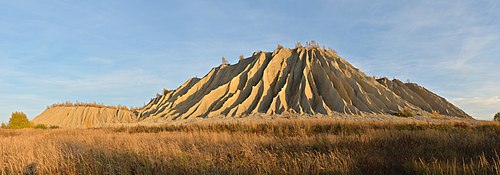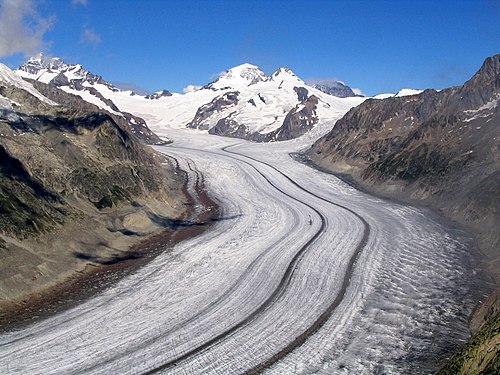Erosionnoun
(uncountable) The result of having been worn away or eroded, as by a glacier on rock or the sea on a cliff face.
Erosionnoun
(uncountable) The changing of a surface by mechanical action, friction, thermal expansion contraction, or impact.
Erosionnoun
The gradual loss of something as a result of an ongoing process.
Erosionnoun
(uncountable) Destruction by abrasive action of fluids.
Erosionnoun
One of two fundamental operations in morphological image processing from which all other morphological operations are derived.
Erosionnoun
(dentistry) Loss of tooth enamel due to non-bacteriogenic chemical processes.
Erosionnoun
(medicine) A shallow ulceration or lesion, usually involving skin or epithelial tissue.
Erosionnoun
(math) In morphology, a basic operation (denoted ⊖); see Erosion (morphology).
Erosionnoun
The act or operation of eroding or eating away.
Erosionnoun
The state of being eaten away; corrosion; canker.
Erosionnoun
The wearing away of the earth's surface by any natural process. The chief agent of erosion is running water; minor agents are glaciers, the wind, and waves breaking against the coast.
Erosionnoun
a gradual reduction or lessening as if by an erosive force; as, erosion of political support due to scandal; erosion of buying power by inflation.
Erosionnoun
(geology) the mechanical process of wearing or grinding something down (as by particles washing over it)
Erosionnoun
condition in which the earth's surface is worn away by the action of water and wind
Erosionnoun
a gradual decline of something;
Erosionnoun
erosion by chemical action
Erosion
In earth science, erosion is the action of surface processes (such as water flow or wind) that removes soil, rock, or dissolved material from one location on the Earth's crust, and then transports it to another location. Erosion is distinct from weathering which involves no movement.
Depositionnoun
The removal of someone from office.
Depositionnoun
The act of depositing material, especially by a natural process; the resultant deposit.
Depositionnoun
(chemistry) The production of a thin film of material onto an existing surface.
Depositionnoun
(legal) The process of taking sworn testimony out of court; the testimony so taken.
Depositionnoun
(meteorology) The formation of snow or frost directly from water vapor.
Depositionnoun
(physics) The transformation of a gas into a solid without an intermediate liquid phase (reverse of sublimation)
Depositionnoun
(religion) The formal placement of relics in a church or shrine, and the feast day commemorating it.
Depositionnoun
The act of depositing or deposing; the act of laying down or thrown down; precipitation.
Depositionnoun
The act of bringing before the mind; presentation.
Depositionnoun
The act of setting aside a sovereign or a public officer; deprivation of authority and dignity; displacement; removal.
Depositionnoun
That which is deposited; matter laid or thrown down; sediment; alluvial matter; as, banks are sometimes depositions of alluvial matter.
Depositionnoun
An opinion, example, or statement, laid down or asserted; a declaration.
Depositionnoun
The act of laying down one's testimony in writing; also, testimony laid or taken down in writing, under oath or affirmation, before some competent officer, and in reply to interrogatories and cross-interrogatories.
Depositionnoun
the natural process of laying down a deposit of something
Depositionnoun
(law) a pretrial interrogation of a witness; usually done in a lawyer's office
Depositionnoun
the act of putting something somewhere
Depositionnoun
the act of deposing someone; removing a powerful person from a position or office

















